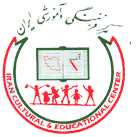The Iran Cultural and Educational Center (ICEC), is a non-profit organization under section 501(C)(3) of the Internal Revenue Code registered in the State of Maryland (Tax ID:52-1703152). The ICEC is an independent institution with no affiliation to any group. The Center (ICEC) is open to all students interested in learning the Persian language and culture. ICEC’s core mission is to create an environment that fosters appreciation of cultural diversity among young learners and thus help them become ambassadors of cultural awareness. The Center (ICEC) does not discriminate based on race, color, religion, and national or ethnic origin.
Empowering young learners and widening their worldview are at the center of every ICEC curricular and extracurricular activity. The parents, instructional staff, officers and administrators work together to provide students with a rich environment that prepares them for today’s world; a world in which multiculturalism and multilingualism are not only valued, but are also the underlying factors that bring about peace and mutual understanding among nations. These learners and countless others like them are the future of the world and are certainly well equipped to make it a thriving and peaceful one.
The ICEC, established in 1989 in its current format, received its non-profit status in 1991. Today, it offers thirteen classes to 170 K-12 students from across the Washington DC metropolitan area. The classes are held on Saturdays from 9:30 AM to 12:30 PM at Ritchie Park Elementary School in Rockville, Maryland. In addition to regular language classes that run from September to June, students who are interested in cultural activities such as, dance, music and drama, may take part in these extracurricular activities from September to March. Currently, the Center has fourteen staff members and ten student assistants.
ICEC that began thirty years ago with only five classes and less than fifty students has grown considerably over the years. There are several reasons for this success and consistent growth:
The pre-eminent reason is the Center’s dedicated, talented, and stable teaching staff. Their dedication to student learning has earned them the respect of the students and parents alike. They go the extra mile to meet the needs of their diverse learners.
ICEC also enjoys the support of vibrant volunteers who assist the Center in many ways. The Community and School Association (CSA), composed of current and former parent volunteers, works with the administration to organize and run the registration, collect and analyze registration data, organize cultural celebrations such as Mehregan (celebration of friendship and harvest in the fall), Yalda (celebration of Winter Solstice) and Nowruz (Iranian New Year that is the celebration of renewal, or spring), and organize ICEC booth at local festivals such as Imagination Bethesda and Silver Spring Festival. In addition, the parent-volunteers help with the Center’s library, security, assisting the teachers with copying instructional materials for classroom use, refreshments, and the student store. Thanks to this close collaboration the Center has become a true community that brings the families together, strengthens cultural ties, and often acts as a support system.
ICEC is also supported by a dedicated Board of Trustees, Officers, and Administrative Staff. The Administrative Staff and Board members work on behalf of the Center as volunteers and a service to the community. The Board is currently composed of the five founding members and two at large members elected by the Community and School Association members. The Board of Directors sets the overarching guidelines and makes decisions about issues affecting the Center’s short and long-term goals. The administrative staff runs the school, oversees the curriculum and its implementation, conducts ongoing professional development, reaches out to the professionals in the field for training, determines students’ placement, assists the instructors by providing guidance and instructional materials, regularly communicates with the parents, acts as a liaison between the CSA and the Board of Directors.
One of the unique aspects of the Center is the active role played by former students. Those students who complete the highest level offered by the Center become teacher assistants. Many students look forward to the time when they can assist the instructors in their classes and mentor younger students. The teaching staff members also greatly value the presence of these students in their classes and eagerly seek their assistance. Furthermore, former students lead the extracurricular activities that are an important part of Nowruz celebration. These college-age leaders who, as students took part in the same activities, now take the responsibility of practicing with the students to prepare them for the Nowruz celebration. Each year, the Persian Dance Troup (PDT), the Young Iranian Musicians (YIM) and the Young Iranian Performers (YIP) attract close to one hundred students who showcase the best of Persian folkloric dance, traditional music and plays adapted from Persian literary works, new and old. They mesmerize the audience with their enchanting and flawless performances.


